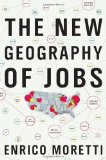…who spoke for over an hour about cities, development, migration, and density, and asserted that America would be more productive if our cities were denser, and did not mention economic rent nor land value?
They did it here, on econ-talk, and you can download the podcast or just read a pretty good text summary (I do not recall them using the word “land” either, but it appears several times in the text summary so I must have missed it). The book itself seems to be available only on Amazon Kindle, which as I understand it means I cannot buy it, but only license a copy to read. But from the interview I gather that author Ryan Avent has determined that American cities (and some suburbs too) are not as densely developed as they “should” be, and that this is due to local governments’ reluctance to allow development at optimal densities.
Now certainly there’s no question that local governments, usually reacting to neighborhood concerns, often refuse to allow development at densities which are physically workable. I recall one suburb where a proposal would have had single-family houses on lots of 9000 square feet. Community reaction was that the kind of people who would live on such small lots would not be desirable neighbors, even tho in many other cities such a lot would be considered oversize. These concerns are often stated as “property value” arguments, and perhaps they really are. That’s an expected consequence of an economic system where ordinary people cannot expect to accumulate much money by working and saving, and must hope to profit from rising prices of the real estate they occupy.
And it’s not unknown for the politicians whose approval is needed for major developments to take advantage of the opportunity for personal gain, legal or otherwise but surely wrong.
So how is it to be decided what the optimal density is? In Science of Political Economy, Henry George observes that, for each kind of production, there is an optimal density at which to work. That density depends on what is being produced, the technology applied, the number of workers available, their skills, the quantity to be produced, etc., so it will change over time. Avent may be correct that we would be better off if higher densities were permitted in some already-dense desirable places, but he certainly didn’t offer much evidence in this podcast.
But let us assume that higher density would be a good thing (and I am certain that in some places it would be), how is it to be achieved? Avent seems to assume that a reduction in land use regulation would be the proper method, because the market is efficient and so density would rise to the appropriate level.
But communities are more complicated than that, and you can’t, or at least shouldn’t, ignore externalities. The first builder to put a high-rise in a desirable townhouse neighborhood may profit nicely. However, not only does the character of the community start to change, but different infrastructure is needed. Can the streets handle the traffic, or can acceptable public transport be provided? Will the sewer and water system handle the load? What are the other effects on the larger community, and how can they be dealt with? There are loads of reasons why it makes sense for the community, acting thru its local government, to have a major say in its development.
But to really irritate those who understand political economy, Avent says:
[I]f you had a sort of density charge–I hate to tax density in that way but in terms of being realistic about the distribution of cost–you could channel some of that into investing in local amenities: could be parks, could be transit, something to try to convince local stake-holders that density is going to be in their interest. So normally we think of taxes as discouraging an activity–which it would. It would make it more expensive for developers to make urban areas more dense.
Yes, some way for the community to share in the benefits of increased density. Can you say “land value tax?” It doesn’t tax development, it taxes development potential. It pressures landowners to build at appropriate densities, but doesn’t punish them for doing so. Supported by competent and realistic zoning, it guides density to the places where is works.
Somebody told me once that the Economist, for which Avent is a correspondent, is a pretty good source of economic news except that it refuses to acknowledge the possibility, let alone the benefits, of a land value tax. I still haven’t seen anything that contradicts this assertion.





